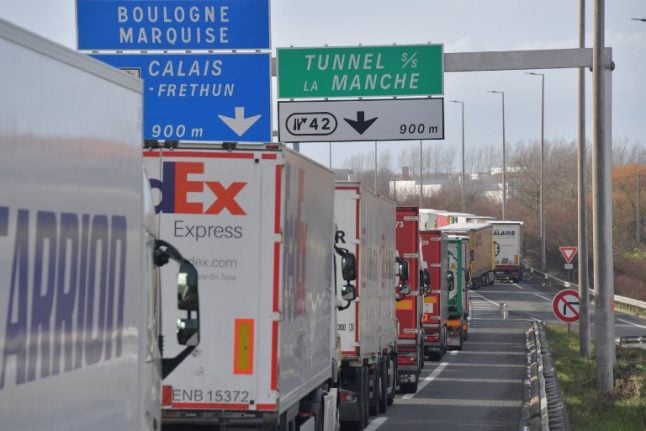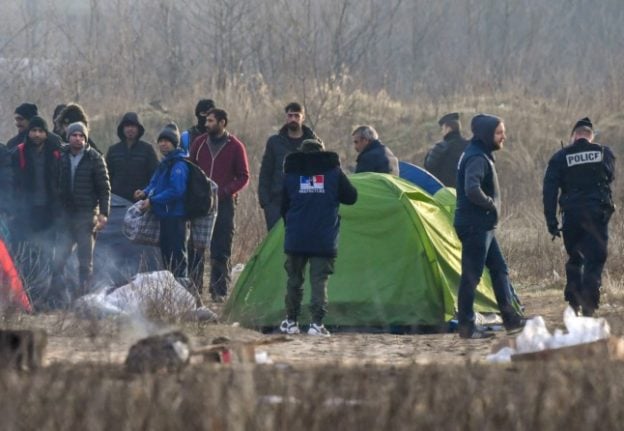Customs agents began their protest on Monday to press their demands for higher pay and demonstrate what will happen if greater controls are put in place once Britain leaves the European Union, planned for later this month.
“Agents are doing longer checks than usual and it creates traffic jams immediately,” Vincent Thomazo from the UNSA union said.
“It's a strike that might last a long time because officers are just doing their jobs.”
Thomazo told The Local on Wednesday the extra checks would continue because customs' agents wanted to get the message across to the French government that they were simply not ready for Brexit.
“Our aim is to attract attention to our worsening conditions of work which will only get worse once Brexit happens,” Thomazo said.
“We are simply not ready. The administration has simply waited too long to get things in place,” he said.
“Many things could happen but we need to be prepared because we are heading for a hard Brexit.”
The French government has announced the recruitment of an extra 700 customs officials, a number seen as insufficient by some unions.
Once Britain has left the EU “there will be stronger controls. Today you have a demonstration of what is going to happen,” said Philippe Bollengier from the CGT union.
On Wednesday customs officials continued to check all trucks going through the Channel Tunnel which created tailbacks of around 600 lorries on the A16 motorway in the direction of the port of Calais. Lorries were also stacked up on the A26 motorway.
The trucks were parked up in the right hand lane causing traffic problems for other vehicles heading towards the port.
One ferry passenger caught up in the delays at Calais told The Local: “The problem is that the exit checks on HGVs has prevented vehicles from leaving the port quickly. Tailbacks stretch back to the ferry that has docked. They can't get off and we can't get on. Gridlock.”
The local La Voix du Nord newspaper reported that motorists were trying to avoid the motorway by heading through the centre of Calais, which was left snarled with traffic as a result.
Drivers heading to the Eurotunnel terminal have been told not to queue with the lorries but be prepared for traffic delays. Eurotunnel insists its service is running as normal although it warned that the tailbacks for lorries would continue for at least a day even if the protest ended.
Heading to our Calais Passenger Terminal? the ongoing regional action by French Customs is still affecting the traffic on the A16. Do not queue with the lorries when approaching our access road. Once Controls cleared, our service is running as planned. Take care ^SL
— Eurotunnel Le Shuttle (@LeShuttle) March 6, 2019
There are similar problems around the port of Dunkirk where lorries were being turned back at the Belgian border.
There was also reports of long queues in the Eurostar terminal at Gare du Nord in Paris where French customs officers were also protesting by carrying out extra checks on all passengers.
Thanks very much for confirming. We are experiencing up to 60 minutes delay on departures from Paris Gare du Nord today because passport and security checks, conducted by the authorities, are currently taking longer than usual, our apologies for the inconvenience caused.
— Eurostar (@Eurostar) March 6, 2019
No joke, French trade unions are staging a “Brexit style” work to rule at the Gare du Nord in Paris today. It’s aimed at getting Eurostar passengers used to long delays, queues, & fractious arguments with surly officials who don’t like the look of blue passports. Allez les gars ! pic.twitter.com/I0iwRrVvRT
— Peter Allen (@peterallenparis) March 6, 2019
However the head of customs services at Calais, Rodolphe Gintz, told AFP that the strike had “absolutely nothing” to do with Brexit.
“It won't happen like this. We are not going to create queues of trucks. We're not going to inspect every truck one after the other for a minute,” he said on Monday.
He explained that controls would be in the other direction — on trucks arriving from Britain — and that there would be extra resources if necessary.
The leader of the Hauts-de-France region, which includes Calais and Dunkirk, told AFP last month that fears about monster traffic jams after Brexit were overblown.
“From our point of view, for the ports and the tunnel, we will be ready,” Xavier Bertrand told AFP.



 Please whitelist us to continue reading.
Please whitelist us to continue reading.
Member comments